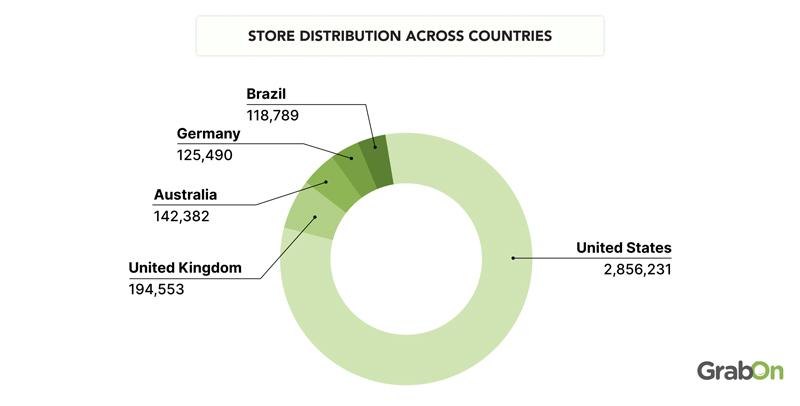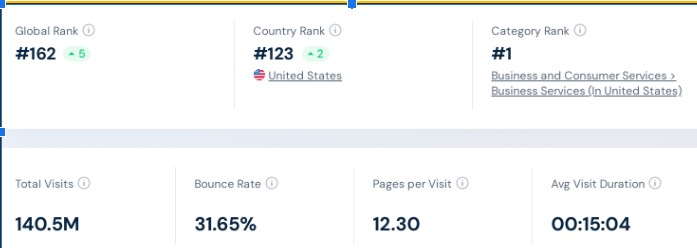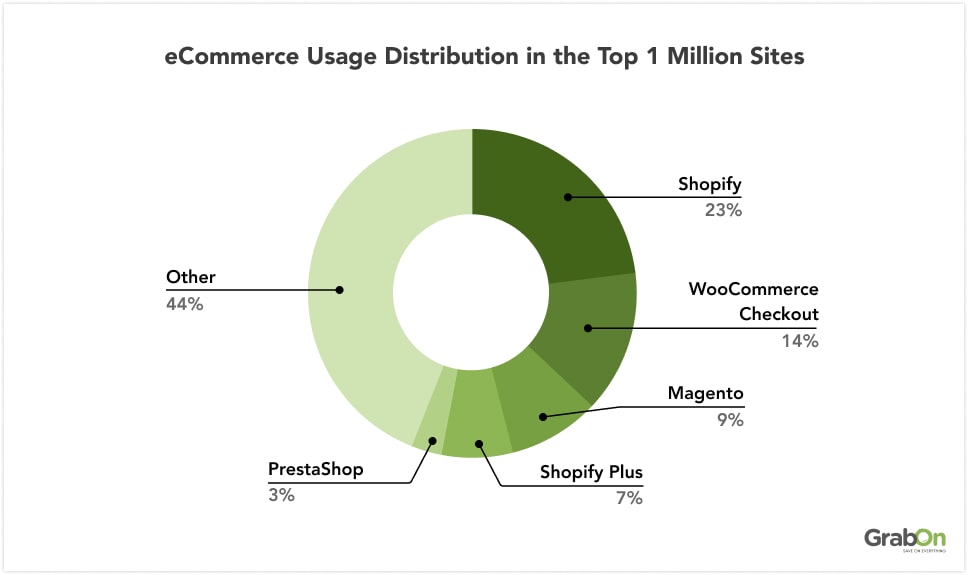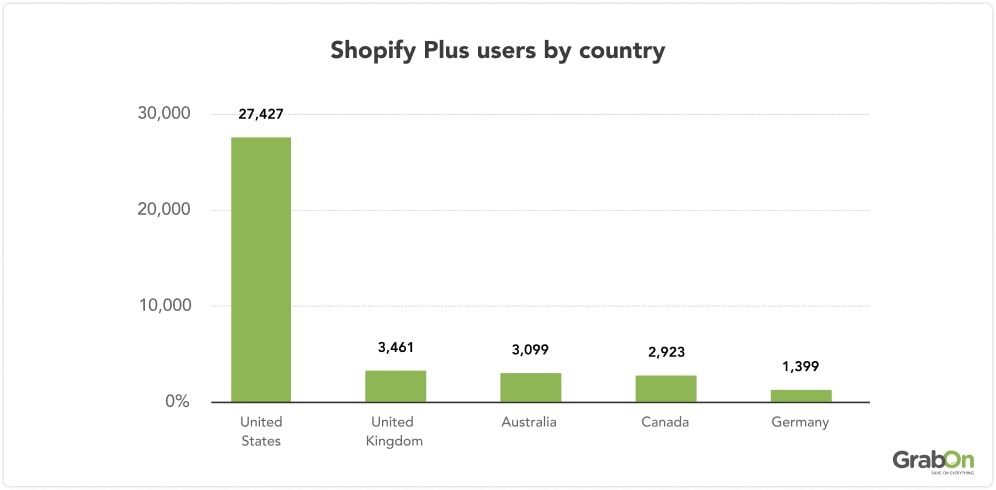When you think of Shopify as a platform, you’ll most likely recognize it as an e-commerce platform, one that has gained quite the name and fame in the industry. Not many know that it started its journey in 2006 as Snowdevil, an online platform for snowboarding equipment.
Today, Shopify hosts over 4.95 million sites across 175 countries. The company also registered a revenue of $7.1 billion in 2023, a 26% increase compared to 2022. How did Shopify achieve such overwhelming success and become Canada’s third-largest publicly traded company? Read on to get the latest Shopify statistics and how the platform did wonders in a short time span.
Top Shopify Statistics (Editor’s Picks)
- There are 4.95 million active Shopify stores worldwide.
- Shopify has 809 million customers.
- Shopify has a 10.32% market share in the global eCommerce market. This increases to 29% in the US market.
- The global count of active Shopify Plus stores stands at 49,165.
- Mobile devices account for 79% of Shopify’s overall traffic.
How Many Users Does Shopify Have?
Shopify has 4.6 million daily active users as of 2024.
Between August and December 2024, Shopify had an average of 4.6 million daily visitors, with a total of 140.98 million visits per month on average. The highest number of visits was recorded in November 2024, reaching 148 million.
In 2023, 675 million people made purchases from Shopify stores, and this number is expected to exceed 700 million. Shopify’s monthly visits fluctuate throughout the year.
Check the table below to see how many Shopify users are there monthly from August to December 2024.
| Month | Monthly Active Users |
| December 2024 | 142.8 million |
| November 2024 | 148 million |
| October 2024 | 140.5 million |
| September 2024 | 135 million |
| August 2024 | 138.6 million |
Source: Similarweb, Shopify
How Many Shopify Stores Are There?
There are 8.84 million Shopify stores on the internet. Of these, 4.95 million are currently live, while 1.65 million domains redirect to one of these sites. Additionally, 3.89 million sites have used Shopify previously.
Shopify powers 2.93% of the top 1 million e-commerce websites and 3.44% of the top 10,000 live e-commerce websites. This means that approximately 56% of all Shopify websites created are currently active.
The number of Shopify stores has grown by 17% from the previous year and 237% since 2020.
| Year | Number of Active Shopify Stores |
| 2020 | 1.6 million |
| 2021 | 3.7 million |
| 2022 | 3.9 million |
| 2023 | 4.6 million |
| 2024 | 4.95 million |
Source: BuiltWith
Which Are The Top Countries Using Shopify?
The United States is the leader in Shopify usage, with approximately 2.86 million active websites, making it the top country on this e-commerce platform. The United Kingdom follows with 194.6K active sites, and Australia ranks third with 142.4K.
Germany and Brazil complete the top five, with 125.5K and 118.8K Shopify websites, respectively. Other notable countries include Canada, Colombia (.co), India, France, and the Netherlands.

| Country | Number of Stores |
| United States | 2,856,231 |
| United Kingdom | 194,553 |
| Australia | 142,382 |
| Germany | 125,490 |
| Brazil | 118,789 |
| Canada | 106,485 |
| Colombia (.co) | 85,848 |
| India | 78,411 |
| France | 72,894 |
| Netherlands | 56,460 |
Source: BuiltWith
Top Companies Using Shopify
Big brands are turning to Shopify because it’s super popular for setting up online stores – more than 4 million websites use it! Shopify lets brands sell products on lots of platforms like Facebook and Amazon. It’s easy to start with, and you can quickly make your store look good. Plus, it’s got special features like lots of ways to get paid, and it works well on phones, too. What’s great is that it’s suitable for both small startups and big companies because it’s affordable but still has all the fancy supplies that big businesses may need. That’s why tons of big names are using Shopify these days. Some of them include
| Top Companies Using Shopify |
| Clothing and Fashion |
| Hiut Denim Co. Tentree Macguire Shoes |
| Art and Home Décor |
| Uppercase magazine Artisaire Terre Bleu |
| Electronics and Gadget |
| Bruvi Kulala Pela |
| Subscription-based |
| Cocofloss Loot Crate Pot Gang |
| Jewelry and Accessories |
| United By Blue Manitobah Mukluks Allbirds |
| Food and Drink |
| BLK & Bold Fly by Jing Verve Coffee Roasters |
| Beauty and Wellness |
| The Honey Pot Package Free Beauty Bakerie |
| Other |
| Healthy Roots Dolls GiveMeTap Lunchskins |
Source: Shopify
How Many Customers Does Shopify Have?
Shopify has over 809 million customers, an increase of 109 million from the 700 million customers in 2023. This represents a 15% growth. Shopify experienced significant growth between 2019 and 2023, adding 400 million customers.
This means that 30% of global online shoppers shop with a Shopify store.
Here’s the table showing the number of Shopify customers by year:
| Year | Number of Shopify Customers |
| 2024 | 809 million |
| 2023 | 700 million |
| 2022 | 649 million |
| 2021 | 572 million |
| 2020 | 457 million |
| 2019 | 300 million |
| 2018 | 216 million |
| 2017 | 163 million |
| 2016 | 100 million |
| 2015 | 57 million |
Source: Company data.
Key Performance Metrics for Shopify

Source: SimilarWeb
Shopify Demographics: Insights into Website Traffic
Shopify’s customer base is predominantly female, accounting for 56.09% of shoppers, while males make up 43.91%. The largest age group is 25-34, representing 33.41% of Shopify’s audience, followed by the 35-44 group at 21.39%, and the 18-24 age bracket at 17.02%. Shoppers aged 45 and above collectively make up 28.19% of the customer base.
The table below gives a detailed breakdown of the age distribution of Shopify’s shoppers:
| Age Range | Percentage |
| 18-24 | 17.02% |
| 25-34 | 33.41% |
| 35-44 | 21.39% |
| 45-54 | 13.48% |
| 55-64 | 8.97% |
| 65+ | 5.74% |
What is the Audience Primarily Interested In?
- Computers, Electronics and Technology
- Programming and Development of Software
- Fashion and Apparel
- Graphics and Multimedia
- New and Television
Top Shopify Categories Searched by Users
- News, television, and media
- Shopping – Fashion and Apparel
- Software support and development
- Business Development
Source: Similarweb
Shopify Stats: Leading the eCommerce Market
The eCommerce market is very competitive, with different platforms running online stores. Among the top 1 million sites, Shopify leads with 25% of the market. WooCommerce Checkout is next with 13%, while Magento and Shopify Plus have 8% and 6%, respectively. PrestaShop has 3% of the market, and various other platforms make up the remaining 44%, showing the diversity in the industry.

Source: BuiltWith
Shopify’s Key Financial Highlights 2024
- Revenue Growth: Shopify made $6.18 billion in the first nine months of 2024, 26% higher than last year.
- Sales Volume (GMV): Customers spent $182.9 billion on Shopify so far this year, reflecting a 24% increase from the same period in 2023.
- Profit Margins: Shopify’s gross profit margin for Q3 2024 was 51.7%, an improvement from 48.4% last year.
- Free Cash Flow: Shopify generated $1.17 billion in free cash flow in 2024, more than triple last year’s amount.
- Annual Outlook: Shopify is on track to exceed $8 billion in annual revenue for 2024.
Source: Shopify
How Much Revenue Does Shopify Make?
Shopify’s quarterly revenue for Q3 2024 reached $2.162 billion, reflecting a 26% increase from $1.714 billion in Q3 2023. The growth was driven by both subscription solutions and merchant solutions revenue, which increased to $610 million and $1.552 billion, respectively. Gross profit for the quarter rose to $1.118 billion, up from $902 million in the previous year.
The table below highlights a few of the top financial metrics of Shopify as of Q3 2024:
| Metric | Q3 2024 | Q3 2023 |
| Total Revenue | $2.162B | $1.714B |
| Subscription Solutions Revenue | $610M | $474M |
| Merchant Solutions Revenue | $1.552B | $1.259B |
| Gross Profit | $1.118B | $902M |
Source: Shopify
What Drives Shopify’s Revenue Streams?
Shopify generates its revenue primarily through two avenues:
Subscription Solutions: This involves merchants paying fees to utilize the Shopify platform. Merchants can select from a range of plans, such as Basic Shopify, Shopify, and Advanced Shopify, each providing different features and tools for managing an online store.
Merchant Solutions: This encompasses various services offered to merchants to aid them in selling their products. It includes Shopify Payments, which processes payments for merchants; Shopify Capital, which provides financing options; and Shopify Shipping, which offers shipping solutions and discounts.
What Is Shopify Plus?
Shopify Plus is Shopify’s enterprise-level solution tailored for high-volume merchants and large brands. It’s a fully hosted eCommerce platform offering scalability and customization. With advanced features like customizable checkouts and increased API calls, Shopify Plus addresses the complex needs of growing businesses, providing dedicated support and infrastructure for rapid expansion. It seamlessly integrates with existing systems through APIs, making it a flexible choice for enterprises seeking to enhance their eCommerce capabilities.
Shopify Plus Usage Statistics
Shopify Plus, Shopify’s premium plan, costs a minimum of $2000 per month and offers an array of advanced features, such as customizable checkouts, increased API calls, and unlimited user accounts.
Currently, there are 49,165 active Shopify Plus stores worldwide. Among these, 27,427 stores are located in the United States. This signifies a notable surge from the previous year, indicating a growing preference for Shopify Plus among high-volume merchants.
Shopify Plus stores now constitute 0.65% of the top one million websites, showcasing their significant influence in the online marketplace. Additionally, the United Kingdom stands as Shopify’s second-largest market, hosting 3,461 Shopify Plus stores, highlighting the platform’s expanding global reach and its attractiveness to businesses beyond North America.

| Country | Number of Shopify Plus Stores |
| United States | 27,427 |
| United Kingdom | 3,461 |
| Australia | 3,099 |
| Canada | 2,923 |
| Germany | 1,399 |
Source: BuiltWith
Key Shopify Milestones So Far (2025)
Since its inception in 2006, Shopify has grown remarkably, transforming from a modest platform for selling snowboards into a global e-commerce powerhouse. Today, Shopify supports millions of merchants across approximately 175 countries. The company employs over 8,300 people and offers more than 13,000 apps in its App Store, providing merchants with a wide array of tools to enhance their online stores.
Shopify’s Theme Store features 70 themes, and its network includes over 780 experts. Financially, Shopify has facilitated total sales of around $1 trillion. These milestones highlight Shopify’s extraordinary journey and its substantial influence on the e-commerce landscape.

Source: Shopify
Wrapping Up
Summarizing Shopify’s journey up to 2025 reveals its profound impact on the e-commerce sector. Through ongoing innovation and strategic expansion, Shopify has cemented its position as a pivotal player, offering holistic solutions to businesses worldwide. Its adaptable framework and strong foundation have empowered merchants globally to optimize their online operations and sales tactics with ease. From its inception to its current standing, Shopify’s trajectory reflects a steadfast dedication to excellence and forward-looking strategies that have consistently fueled its growth and triumph in the digital realm.







